Spike Lee
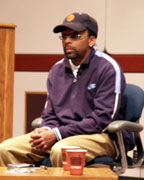 April 3, 2003, Greencastle, Ind. - Calling the current world climate "chaotic," director, producer, writer and actor Spike Lee predicts more Hollywood films will deal with the events of September 11, 2001 and the aftermath. Lee, at 色狐入口 to deliver a Timothy and Sharon Ubben Lecture, depicted post 9/11 New York in his latest, acclaimed film, 25th Hour. At an afternoon media briefing at 色狐入口's Eugene S. Pulliam Center for Contemporary Media, Lee said that among filmmakers, "There was a self-imposed moratorium [of] at least a year, but we're definitely gonna see films, Bruckheimer films about the stuff." Jerry Bruckheimer is a film producer responsible for such films as Top Gun and Pearl Harbor.
April 3, 2003, Greencastle, Ind. - Calling the current world climate "chaotic," director, producer, writer and actor Spike Lee predicts more Hollywood films will deal with the events of September 11, 2001 and the aftermath. Lee, at 色狐入口 to deliver a Timothy and Sharon Ubben Lecture, depicted post 9/11 New York in his latest, acclaimed film, 25th Hour. At an afternoon media briefing at 色狐入口's Eugene S. Pulliam Center for Contemporary Media, Lee said that among filmmakers, "There was a self-imposed moratorium [of] at least a year, but we're definitely gonna see films, Bruckheimer films about the stuff." Jerry Bruckheimer is a film producer responsible for such films as Top Gun and Pearl Harbor.
Lee, called "not only one of the best filmmakers in America, but one of the most crucially important," by film critic Roger Ebert, says Hollywood avoided films with plots related to terrorism, and even removed shots of the World Trade Center from movies about to be released, because "they were worried. They did not know how American audiences, and if they didn't know how American audiences would react there was a good chance they would react negatively and that would reflect on the box office. So, they were not going to take that chance to affect the bottom line." (Lee is seen at right with 色狐入口's director of media relations, Ken Owen '82)
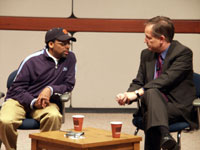 Lee says Hollywood, and the public, became obsessed with box office receipts in the mid-1970's, an obsession that continues to this day. "Jaws really brought about the world of [the] blockbuster, where you made huge amounts of money on the opening weekend. Audiences weren't aware of the grosses of films. Now every newspaper in America on Monday prints the top 10 grossing films of the past weekend, so the audience is much more aware of how much everybody's getting, how much films cost, how much they've made, and sometimes I think they think that's even more important than whether the film is good or not. That stuff's really been to the detriment of the movie-going audience, I think." (photo at left shows Lee with Bob Hershberger, assistant professor of Spanish and Film at 色狐入口)
Lee says Hollywood, and the public, became obsessed with box office receipts in the mid-1970's, an obsession that continues to this day. "Jaws really brought about the world of [the] blockbuster, where you made huge amounts of money on the opening weekend. Audiences weren't aware of the grosses of films. Now every newspaper in America on Monday prints the top 10 grossing films of the past weekend, so the audience is much more aware of how much everybody's getting, how much films cost, how much they've made, and sometimes I think they think that's even more important than whether the film is good or not. That stuff's really been to the detriment of the movie-going audience, I think." (photo at left shows Lee with Bob Hershberger, assistant professor of Spanish and Film at 色狐入口)
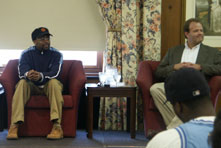 During his Ubben Lecture, Lee told the approximately 2,100 people in Neal Fieldhouse of the Lilly Center that while he is unhappy that the U.S. is waging war on Iraq, he supports the American troops. "Being against the war does not necessarily mean that you are unpatriotic... And it's funny how a lot of times art mirrors life and vice versa. For those of you who've not seen one of the greatest anti-war films ever, directed by Stanley Kubrick, Dr. Strangelove, please go check that film out and see if that character played by the great actor Sterling Haden is not a dead ringer for [Defense Secretary Donald] Rumsfeld," Lee said.
During his Ubben Lecture, Lee told the approximately 2,100 people in Neal Fieldhouse of the Lilly Center that while he is unhappy that the U.S. is waging war on Iraq, he supports the American troops. "Being against the war does not necessarily mean that you are unpatriotic... And it's funny how a lot of times art mirrors life and vice versa. For those of you who've not seen one of the greatest anti-war films ever, directed by Stanley Kubrick, Dr. Strangelove, please go check that film out and see if that character played by the great actor Sterling Haden is not a dead ringer for [Defense Secretary Donald] Rumsfeld," Lee said.
Turning serious, the director of Do the Right Thing and Malcolm X said, "It's very important that young people become conscious and understand what's happening in the world. I'm not asking you to think my way, what I am asking is to question and don't just digest everything that you read or see on television. Ask more questions. When you get out of that American Idol, Survivor, Joe Millionaire, Temptation Island mode of thinking, leave that alone for a second and deal with some stuff that's really impacting your lives. 'Cause who's to say they're not going to bring back the draft?"
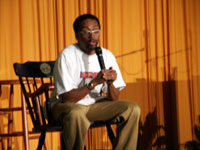 Lee, who has made 18 films, says there are many more black filmmakers and actors working today than when he began nearly twenty years ago. He says he is "building a body of work" that is designed to "somehow showcase different aspects of the African American experience. Growing up, I'd see all this richness of our culture just standing on the corner or looking out the window, but rarely was it reflected on the screen or on television." Despite the gains in recent years, Lee says there are only three genres of black films being made today -- romantic comedies, lowbrow comedies, and hip-hop/shoot 'em up drug movies -- which reinforce stereotypes and don't begin to display the richness of black America.
Lee, who has made 18 films, says there are many more black filmmakers and actors working today than when he began nearly twenty years ago. He says he is "building a body of work" that is designed to "somehow showcase different aspects of the African American experience. Growing up, I'd see all this richness of our culture just standing on the corner or looking out the window, but rarely was it reflected on the screen or on television." Despite the gains in recent years, Lee says there are only three genres of black films being made today -- romantic comedies, lowbrow comedies, and hip-hop/shoot 'em up drug movies -- which reinforce stereotypes and don't begin to display the richness of black America.
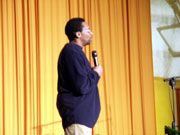 "It's much more dangerous now, and the reason I say that is this: when I was growing up, we looked up to guys who were great athletes, guys who knew how to talk to ladies, and third but not least, guys that were intelligent," Lee told the 色狐入口 crowd. "Now somehow between then and today, the whole value system has been upended, what's down is up, what's up is down. Because amongst many African-American youth today, if you strive to become educated and get your grades and speak correct English and be able to speak a sentence without profanity, then you are ridiculed and ostracized as being a 'white boy' or 'white girl' or 'sellout', an 'oreo', which is crazy. But if you're on the corner, drinkin' a 40, smokin' a blunt, holding your privates, then you're keepin' it real. And that is pathological, that is genocide."
"It's much more dangerous now, and the reason I say that is this: when I was growing up, we looked up to guys who were great athletes, guys who knew how to talk to ladies, and third but not least, guys that were intelligent," Lee told the 色狐入口 crowd. "Now somehow between then and today, the whole value system has been upended, what's down is up, what's up is down. Because amongst many African-American youth today, if you strive to become educated and get your grades and speak correct English and be able to speak a sentence without profanity, then you are ridiculed and ostracized as being a 'white boy' or 'white girl' or 'sellout', an 'oreo', which is crazy. But if you're on the corner, drinkin' a 40, smokin' a blunt, holding your privates, then you're keepin' it real. And that is pathological, that is genocide."
Lee says those negative behaviors are influenced by popular music, music videos and films. He cited best-selling rapper 50 Cent as the highest-profile recent offender, "the reason why he's huge is because he's been shot 12 times... How more legitimate can you get? He got shot and lived to rap about it. This whole mythology and fascination with gangsta culture... look at the title of the CD, Get Rich or Die Tryin'. That's crazy. That is the motto of many of these young black kids." Lee says the CD's booklet displays pictures of guns, "and this whole fascination of drug stuff. It is crazy, insane. He's on the cover of Rolling Stone this week, and at the end of the article his mother comes in the dressing room proud as a peacock showing everybody who'll look the custom made bulletproof vest she made for his 5-year-old son. Bulletproof vest for a 5-year-old kid and that's supposed to be hip, something we should strive for. That's some b.s., I'm sorry," Lee said to applause.
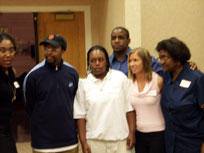 Spike Lee urged students to dream and pursue careers doing things they love, not chase careers because they come with the promise of a hefty salary. When asked what young people who are interested in becoming filmmakers should focus on, Lee responded, "writing." He added, "One of the reasons I wanted to teach [he's a professor at NYU and has taught at Harvard] is because students are at a disadvantage when they're being taught something by instructors or teachers that are only teaching from theory. It's very important that film students are taught by people who've made a film, by someone who has written a script, who's written a TV show, who has sat in a room with executives -- other than that, it's just theory. Not to say that you can't learn from them, but I think there's great value in students' understanding when they have a teacher who has a film in a theater now."
Spike Lee urged students to dream and pursue careers doing things they love, not chase careers because they come with the promise of a hefty salary. When asked what young people who are interested in becoming filmmakers should focus on, Lee responded, "writing." He added, "One of the reasons I wanted to teach [he's a professor at NYU and has taught at Harvard] is because students are at a disadvantage when they're being taught something by instructors or teachers that are only teaching from theory. It's very important that film students are taught by people who've made a film, by someone who has written a script, who's written a TV show, who has sat in a room with executives -- other than that, it's just theory. Not to say that you can't learn from them, but I think there's great value in students' understanding when they have a teacher who has a film in a theater now."
Between the afternoon media briefing and the evening Ubben Lecture, Lee attended a forum where he spent an hour talking with, and taking questions from, 色狐入口 students. He also had dinner with a group of students, faculty and alumni at the Union Building.
 April 3, 2003, Greencastle, Ind. - Calling the current world climate "chaotic," director, producer, writer and actor Spike Lee predicts more Hollywood films will deal with the events of September 11, 2001 and the aftermath. Lee, at 色狐入口 to deliver a Timothy and Sharon Ubben Lecture, depicted post 9/11 New York in his latest, acclaimed film, 25th Hour. At an afternoon media briefing at 色狐入口's Eugene S. Pulliam Center for Contemporary Media, Lee said that among filmmakers, "There was a self-imposed moratorium [of] at least a year, but we're definitely gonna see films, Bruckheimer films about the stuff." Jerry Bruckheimer is a film producer responsible for such films as Top Gun and Pearl Harbor.
April 3, 2003, Greencastle, Ind. - Calling the current world climate "chaotic," director, producer, writer and actor Spike Lee predicts more Hollywood films will deal with the events of September 11, 2001 and the aftermath. Lee, at 色狐入口 to deliver a Timothy and Sharon Ubben Lecture, depicted post 9/11 New York in his latest, acclaimed film, 25th Hour. At an afternoon media briefing at 色狐入口's Eugene S. Pulliam Center for Contemporary Media, Lee said that among filmmakers, "There was a self-imposed moratorium [of] at least a year, but we're definitely gonna see films, Bruckheimer films about the stuff." Jerry Bruckheimer is a film producer responsible for such films as Top Gun and Pearl Harbor. Lee says Hollywood, and the public, became obsessed with box office receipts in the mid-1970's, an obsession that continues to this day. "Jaws really brought about the world of [the] blockbuster, where you made huge amounts of money on the opening weekend. Audiences weren't aware of the grosses of films. Now every newspaper in America on Monday prints the top 10 grossing films of the past weekend, so the audience is much more aware of how much everybody's getting, how much films cost, how much they've made, and sometimes I think they think that's even more important than whether the film is good or not. That stuff's really been to the detriment of the movie-going audience, I think." (photo at left shows Lee with Bob Hershberger, assistant professor of Spanish and Film at 色狐入口)
Lee says Hollywood, and the public, became obsessed with box office receipts in the mid-1970's, an obsession that continues to this day. "Jaws really brought about the world of [the] blockbuster, where you made huge amounts of money on the opening weekend. Audiences weren't aware of the grosses of films. Now every newspaper in America on Monday prints the top 10 grossing films of the past weekend, so the audience is much more aware of how much everybody's getting, how much films cost, how much they've made, and sometimes I think they think that's even more important than whether the film is good or not. That stuff's really been to the detriment of the movie-going audience, I think." (photo at left shows Lee with Bob Hershberger, assistant professor of Spanish and Film at 色狐入口) During his Ubben Lecture, Lee told the approximately 2,100 people in Neal Fieldhouse of the Lilly Center that while he is unhappy that the U.S. is waging war on Iraq, he supports the American troops. "Being against the war does not necessarily mean that you are unpatriotic... And it's funny how a lot of times art mirrors life and vice versa. For those of you who've not seen one of the greatest anti-war films ever, directed by Stanley Kubrick, Dr. Strangelove, please go check that film out and see if that character played by the great actor Sterling Haden is not a dead ringer for [Defense Secretary Donald] Rumsfeld," Lee said.
During his Ubben Lecture, Lee told the approximately 2,100 people in Neal Fieldhouse of the Lilly Center that while he is unhappy that the U.S. is waging war on Iraq, he supports the American troops. "Being against the war does not necessarily mean that you are unpatriotic... And it's funny how a lot of times art mirrors life and vice versa. For those of you who've not seen one of the greatest anti-war films ever, directed by Stanley Kubrick, Dr. Strangelove, please go check that film out and see if that character played by the great actor Sterling Haden is not a dead ringer for [Defense Secretary Donald] Rumsfeld," Lee said. Lee, who has made 18 films, says there are many more black filmmakers and actors working today than when he began nearly twenty years ago. He says he is "building a body of work" that is designed to "somehow showcase different aspects of the African American experience. Growing up, I'd see all this richness of our culture just standing on the corner or looking out the window, but rarely was it reflected on the screen or on television." Despite the gains in recent years, Lee says there are only three genres of black films being made today -- romantic comedies, lowbrow comedies, and hip-hop/shoot 'em up drug movies -- which reinforce stereotypes and don't begin to display the richness of black America.
Lee, who has made 18 films, says there are many more black filmmakers and actors working today than when he began nearly twenty years ago. He says he is "building a body of work" that is designed to "somehow showcase different aspects of the African American experience. Growing up, I'd see all this richness of our culture just standing on the corner or looking out the window, but rarely was it reflected on the screen or on television." Despite the gains in recent years, Lee says there are only three genres of black films being made today -- romantic comedies, lowbrow comedies, and hip-hop/shoot 'em up drug movies -- which reinforce stereotypes and don't begin to display the richness of black America. "It's much more dangerous now, and the reason I say that is this: when I was growing up, we looked up to guys who were great athletes, guys who knew how to talk to ladies, and third but not least, guys that were intelligent," Lee told the 色狐入口 crowd. "Now somehow between then and today, the whole value system has been upended, what's down is up, what's up is down. Because amongst many African-American youth today, if you strive to become educated and get your grades and speak correct English and be able to speak a sentence without profanity, then you are ridiculed and ostracized as being a 'white boy' or 'white girl' or 'sellout', an 'oreo', which is crazy. But if you're on the corner, drinkin' a 40, smokin' a blunt, holding your privates, then you're keepin' it real. And that is pathological, that is genocide."
"It's much more dangerous now, and the reason I say that is this: when I was growing up, we looked up to guys who were great athletes, guys who knew how to talk to ladies, and third but not least, guys that were intelligent," Lee told the 色狐入口 crowd. "Now somehow between then and today, the whole value system has been upended, what's down is up, what's up is down. Because amongst many African-American youth today, if you strive to become educated and get your grades and speak correct English and be able to speak a sentence without profanity, then you are ridiculed and ostracized as being a 'white boy' or 'white girl' or 'sellout', an 'oreo', which is crazy. But if you're on the corner, drinkin' a 40, smokin' a blunt, holding your privates, then you're keepin' it real. And that is pathological, that is genocide." Spike Lee urged students to dream and pursue careers doing things they love, not chase careers because they come with the promise of a hefty salary. When asked what young people who are interested in becoming filmmakers should focus on, Lee responded, "writing." He added, "One of the reasons I wanted to teach [he's a professor at NYU and has taught at Harvard] is because students are at a disadvantage when they're being taught something by instructors or teachers that are only teaching from theory. It's very important that film students are taught by people who've made a film, by someone who has written a script, who's written a TV show, who has sat in a room with executives -- other than that, it's just theory. Not to say that you can't learn from them, but I think there's great value in students' understanding when they have a teacher who has a film in a theater now."
Spike Lee urged students to dream and pursue careers doing things they love, not chase careers because they come with the promise of a hefty salary. When asked what young people who are interested in becoming filmmakers should focus on, Lee responded, "writing." He added, "One of the reasons I wanted to teach [he's a professor at NYU and has taught at Harvard] is because students are at a disadvantage when they're being taught something by instructors or teachers that are only teaching from theory. It's very important that film students are taught by people who've made a film, by someone who has written a script, who's written a TV show, who has sat in a room with executives -- other than that, it's just theory. Not to say that you can't learn from them, but I think there's great value in students' understanding when they have a teacher who has a film in a theater now."